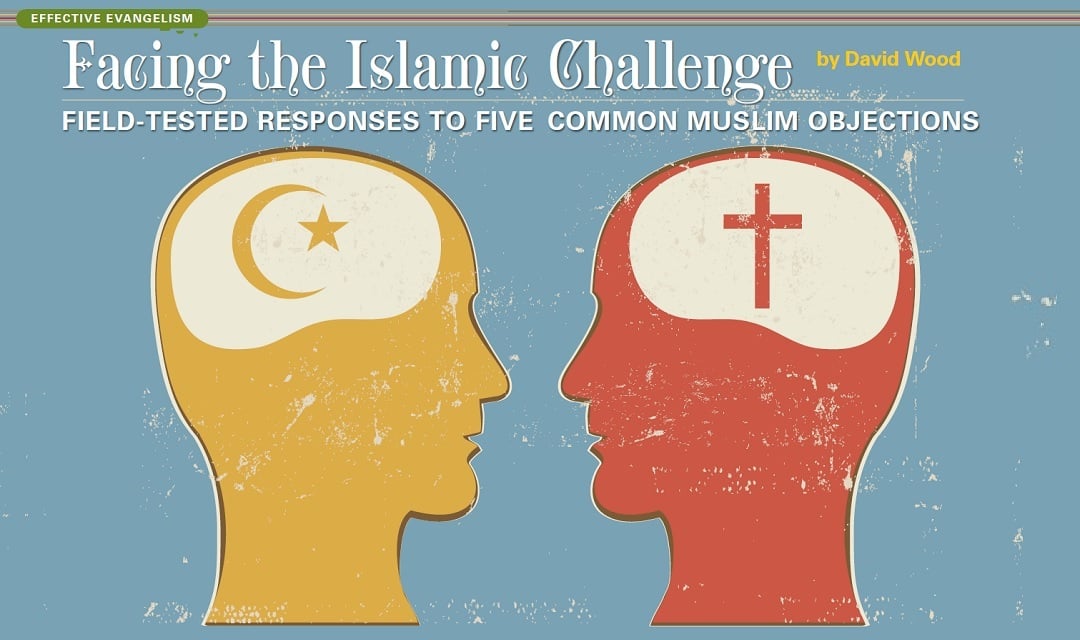This article first appeared in Christian Research Journal, volume 36, number 04 (2013). For further information about the Christian Research Journal, click here.
SYNOPSIS
Christians are commanded to “make disciples of all the nations” (Matt. 28:19). Because Muslims make up more than a fifth of the world’s population, obeying the Great Commission entails presenting the gospel to Muslims. Yet the message of Islam contradicts the teachings of Christ on several key doctrines, so Muslims understandably have important objections to Christianity. Nevertheless, because apologetics in America and Europe has placed far more emphasis on atheism than it has on Islam, many Christians know little about Islam and do not feel equipped to engage Muslims in dialogue. It should be encouraging to learn, however, that successfully defending the gospel against Muslim objections is a rather easy skill to develop.
Islam requires Muslims to agree with Christian doctrine in ways that Muslims themselves are often unaware of. These points of obligatory theological agreement can be brought to the surface and used to undermine or block nearly all Muslim objections to the gospel. Moreover, due to Islam’s insistence on (a) belief in Jesus as a messenger of God and (b) belief in Christian Scripture as a revelation from God, Muslims have relatively few criticisms they can raise. Challenges to the historical reliability of the Gospels, the deity of Christ, the Incarnation, the justice of Jesus’ payment for sins, and the practical implications of Christian doctrine should therefore be viewed as excellent opportunities to share the gospel, rather than as threats to the gospel.
Christian apologetics in the West frequently is geared toward refuting atheism and other skeptical positions. Believers who search for a philosophical or historical defense of the gospel will therefore find no shortage of books and videos on God’s existence, Jesus’ resurrection, and the problem of evil. Yet Christians are increasingly being confronted by an ideology that poses no objections to the existence of God or to the reality of miracles, one that sees no conflict between human suffering and the goodness of our Creator. I am referring, of course, to Islam.
Muslims agree with Christians that the world is the product of an all-powerful, all-knowing, perfectly good Being who has sent numerous prophets to mankind and who will eventually judge the world. Concerning Jesus, Muslims acknowledge that He was born of a virgin, that He performed numerous miracles, and that He is the Messiah. Despite such significant accord, however, the message of Islam attacks the very core of the gospel by denying Jesus’ sacrificial death and divine nature.
Christians who discuss the gospel with Muslims often make a crucial mistake: they answer a Muslim the same way they would answer an atheist who raised a similar objection. But Muslims are not atheists, and their reasons for criticizing the gospel are usually completely different from those of atheists. Moreover, Muslims have certain theological commitments that can actually help the Christian undermine criticisms. By familiarizing ourselves with a simple approach to dealing with Islamic challenges, we can clear away a good deal of rubble on our way to a careful presentation of Jesus’ message.
In this article, we will examine five common Muslim objections to Christianity. Since these are the standard talking points for Muslims when they hear the gospel, Christians have an excellent opportunity to prepare our responses before challenges are ever raised.
“THE GOSPEL HAS BEEN CORRUPTED”
One of Islam’s “Six Articles of Faith” requires Muslims to believe not only in the Qur’an, but also in the scriptures revealed prior to the Qur’an, including the Gospel given to Christians (where “Gospel” refers to a book, rather than to a message1). Nevertheless, since the Gospel contradicts Muhammad’s message on several fundamental doctrines, Muslims have been forced to claim that the Gospel has been corrupted. Any Christian who witnesses to Muslims will be told repeatedly that the scriptures we possess, while possibly retaining some truth, have been hopelessly altered.
Due to a strong emphasis on textual criticism in the Christian tradition, it is quite natural for apologists to defend the New Testament by pointing to early manuscripts. Yet when the charge of corruption comes from a Muslim, we must remember that the charge has nothing to do with manuscript evidence. Providing manuscript evidence to our Muslim friends will likely miss the true source of the objection—namely, the Gospel contradicting the Qur’an.
Imagine the surprise of a Muslim critic when we inform him that, in claiming the Gospel has been corrupted, Muslims themselves are contradicting the Qur’an! Contrary to popular Muslim assertions, the Qur’an affirms the inspiration, preservation, and authority of the Gospel we possess. By drawing the Muslim’s attention to the Qur’an’s position on Christian Scripture, we strike at the root of his objection and help him see the internal incoherence of Islam.
Inspiration of the Gospel
The Qur’an declares that the Gospel was revealed as “a guidance for the people”: “He has revealed to you the Book with truth, verifying that which is before it, and He revealed the Torah and the Gospel aforetime, a guidance for the people, and He sent the Qur’an” (3:3–4, Shakir2).
Hence, no informed Muslim would ever deny the inspiration of the Gospel. Yet Muslims frequently insist that the Gospel was significantly altered sometime after it was revealed, a claim that conflicts with numerous passages in the Qur’an.
Preservation of the Gospel
According to the Qur’an, Christians were still reading the Gospel during Muhammad’s time (seventh century AD), for they supposedly found predictions about him somewhere in the text: “Those who follow the Messenger, the unlettered Prophet, whom they find mentioned in their own (Scriptures)—in the Law and the Gospel—…it is they who will prosper” (7:157, Ali3).
Even more interestingly, when Muhammad experienced some kind of doubts about his revelations, Allah commanded him in the Qur’an to go to the “People of the Book” (an Islamic title for Christians and Jews) for confirmation of his message: “But if you [i.e., Muhammad] are in doubt as to what We have revealed to you, ask those who read the Book before you; certainly the truth has come to you from your Lord, therefore you should not be of the disputers” (10:94, Shakir). How could Muhammad seek confirmation from people who had been reading the “Book” unless they still had it with them?
The Qur’an goes further, maintaining that no one can corrupt Allah’s revelations: “And recite what has been revealed to you of the Book of your Lord, there is none who can alter His words; and you shall not find any refuge besides Him” (18:27, Shakir). If no one can alter Allah’s words, and Allah revealed the Gospel, then the Gospel cannot be altered.
Authority of the Gospel
Not surprisingly, since the Qur’an affirms the inspiration and preservation of the Gospel, Christians are ordered to judge by what we read in our own scriptures: “Let the people of the Gospel judge by what Allah hath revealed therein. If any do fail to judge by (the light of) what Allah hath revealed, they are (no better than) those who rebel“ (5:47, Ali).
Needless to say, Christians cannot obey this command if we no longer posses the Gospel. The Qur’an goes so far as to say that we have no ground to stand on without the Torah and the Gospel: “Say: ‘O People of the Book! Ye have no ground to stand upon unless ye stand fast by the Law, the Gospel, and all the revelation that has come to you from your Lord’” (5:68, Ali). Why would the Qur’an say that we must “stand fast” by the Gospel if the Gospel is no longer available?
Muslim objections to the authority of the Gospel are in obvious conflict with clear statements in the Qur’an. Hence, if the Gospel has been corrupted (as Muslims insist), we can only conclude that the Qur’an is wrong when it claims (1) that the Gospel was still available in Muhammad’s time, (2) that no one can alter Allah’s words, and (3) that Christians must “judge by” and “stand fast by” the Gospel. If Muslims do not want to undermine the authority of their own book, they must abandon claims of Gospel corruption.
“WHERE DID JESUS SAY, ‘I AM GOD’?”
Since Muslims cannot reject our scriptures without rejecting the Qur’an as well, they can only deny Christian doctrine by maintaining that our scriptures don’t actually teach what we believe. This is an especially common approach in discussions about the deity of Christ. Muslims around the world have been trained to ask Christians: “Where did Jesus claim to be God?”
Many apologetics books include analyses of Jesus’ statements about His divine nature. Yet Muslims typically try to reinterpret these statements so that they line up with the Islamic view of Jesus. However, there is a helpful tool that can block such reinterpretations. According to both the Bible and the Qur’an, only God can truly make certain claims, and an Islamic prophet would never utter such claims. For instance, God alone can correctly state that He created the universe. While a mere human being is able say the words, “I created the universe,” the statement would be false coming from anyone other than God.
Hence, if Jesus said things that can only truly be said by God, we must conclude that Jesus claimed to be God. Let us consider Jesus’ words in the light of the Qur’an and the Old Testament.
God’s Glory
The Qur’an tells Muslims that “whatever is in the heavens and the earth declares the glory of Allah” (57:1, Shakir). Similarly, in the Old Testament, God says that He will not share His glory with anyone: “I am the LORD, that is My name; I will not give My glory to another” (Isa. 42:8).4 Yet Jesus claimed that He had glory with the Father before the world was created: “Now, Father, glorify Me together with Yourself, with the glory which I had with You before the world was” (John 17:5). How can this be seen as anything other than a claim to deity?
The Final Judge
In Joel 3, God declares that the nations will be gathered and that He “will sit to judge all the surrounding nations” (v. 12). In Psalm 9:7–8, David says that “the LORD abides forever; He has established His throne for judgment, and He will judge the world in righteousness.”
The Qur’an maintains that Allah will judge the world, rewarding believers and punishing unbelievers: “The kingdom on that day shall be Allah’s; He will judge between them; so those who believe and do good will be in gardens of bliss. And (as for) those who disbelieve in and reject Our communications, these it is who shall have a disgraceful chastisement” (22:56–57, Shakir).
So why, we may wonder, would Jesus tell His followers that He will be the final judge of all people? “But when the Son of Man comes in His glory, and all the angels with Him, then He will sit on His glorious throne. All the nations will be gathered before Him; and He will separate them from one another, as the shepherd separates the sheep from the goats” (Matt. 25:31–32). Jesus goes on to say that He will admit certain people to heaven and cast others into hell. Isn’t this something only God can do?
The Resurrection
The Bible and the Qur’an agree that God will eventually raise the dead. “The LORD kills and makes alive; He brings down to Sheol and raises up” (1 Sam. 2:6). “Allah shall raise up those who are in the graves” (Qur’an 22:7, Shakir).
Since God will raise the dead at the resurrection, why would a mere prophet tell His followers that He will resurrect the dead? Jesus said:
“Truly, truly, I say to you, an hour is coming and now is, when the dead will hear the voice of the Son of God, and those who hear will live. For just as the Father has life in Himself, even so He gave to the Son also to have life in Himself; and He gave Him authority to execute judgment, because He is the Son of Man. Do not marvel at this; for an hour is coming, in which all who are in the tombs will hear His voice, and will come forth; those who did the good deeds to a resurrection of life, those who committed the evil deeds to a resurrection of judgment.” (John 5:25–29)5
Further Evidence
No one who understands Jesus’ words can seriously maintain that He viewed Himself as a mere prophet. Indeed, again and again in the Gospels, we find Jesus saying things that would be blasphemy coming from anyone other than God. In Mark 2:28, Jesus calls Himself the “Lord of the Sabbath.” He claims that He has an absolutely unique relationship with the Father (Matt. 11:27), that He can answer prayers (John 14:13–14), that He is present wherever His followers are gathered (Matt. 18:20), that He has “all authority in heaven and on earth” (Matt. 28:18), and that He is with His followers forever (Matt. 28:20). He even makes the startling declaration that “all things that the Father has are Mine” (John 16:15).
According to Jesus, all people must honor Him just as we honor the Father: “’For just as the Father raises the dead and gives them life, even so the Son also gives life to whom He wishes. For not even the Father judges anyone, but He has given all judgment to the Son, so that all will honor the Son even as they honor the Father. He who does not honor the Son does not honor the Father who sent Him’” (John 5:21–23).
Since one of the ways we honor the Father is by worshiping Him, it should come as no surprise that Jesus’ followers worshiped Him on numerous occasions. The Gospel tells us that Jesus was worshiped throughout His life: shortly after His birth (Matt. 2:11), during His ministry (Matt. 14:33; John 9:38), after His resurrection (Matt. 28:17), and after His ascension (Luke 24:52). Thomas even addressed Him as “my Lord and my God” (John 20:28).
The Jesus of the Gospel bears little resemblance to the Jesus of the Qur’an. But since the Qur’an affirms the authority of the Gospel, it is Muslims, rather than Christians, who have a theological problem with Jesus’ claims.
“HOW CAN GOD DIE?”
Another Muslim objection to Jesus’ deity is based not on His claims, but on a supposed incoherence in the Christian message. On a superficial level, we can see the Muslim’s point. Christians believe that Jesus is God. But God is eternal; He has no beginning and no end. Jesus, on the other hand, was born in Bethlehem and died on the cross (at least, according to Christianity). So if Jesus is God, then God died on the cross. What sense does it make to say that God died?
A correct theological response to this challenge would involve a discussion of the Incarnation and include some exegesis of John 1:1–14, Philippians 2:5–11, and related passages. However, even the most careful and accurate presentation of the doctrine of the Incarnation will not persuade the Muslim that the Christian position makes sense, for he has been trained all his life to regard our position as illogical and absurd. Fortunately, there is a simple way both to help the Muslim understand the Incarnation and to convince him to drop his criticisms of it.
According to Islamic theology, the Qur’an is Allah’s eternal Word. Indeed, Muslims who suggest that the Qur’an had a beginning are regarded as heretics, for the Qur’an is said to be uncreated and incorruptible. But think about the problem such a view raises. I open a copy of the Qur’an and I find that it has a publication date. Since it is made of paper, glue, and ink, it will eventually fall apart. Not long ago, a man named Terry Jones caused an international uproar by burning a copy of the Qur’an. Here we may be forgiven for asking our Muslim friends, “How can the uncreated Word of Allah have a publication date? How can something made of paper, glue, and ink be incorruptible? How can something eternal be burned?”
The correct response to these questions (even though the Muslim has probably never considered the issue) is that, according to Islam, the Qur’an has two natures. As Allah’s eternal Word, it was not created and cannot be destroyed. Yet when Allah’s Word enters our world, it takes on a physical nature made of paper, glue, and ink. From an Islamic perspective, a person may destroy the physical nature of the Qur’an, but this would have no impact whatsoever on the eternal nature of the Qur’an.
After drawing the Muslim’s attention to the teachings of his own religion, the ground is now clear to declare that he has no basis for saying that the Christian doctrine of the Incarnation is illogical, for Islam requires him to believe something analogous. If Christians are foolish for believing that “in the beginning was the Word, and the Word was with God, and the Word was God” (John 1:1), and that “the Word became flesh,
and dwelt among us” (v. 14), then Muslims would be every bit as foolish for believing that Allah’s eternal Word became a physical book. Just as Muslims would never say that Allah’s eternal Word ceases to exist when someone burns a Qur’an, Christians would not say that Jesus’ divine nature ceased to exist when He died on a cross. The Muslim objection falls apart.
“IT WOULD BE UNJUST TO PUNISH ONE MAN
FOR THE SINS OF ANOTHER”
It’s one thing to say that the Incarnation is a coherent doctrine; it’s quite another to say that Jesus actually died for our sins. Muslims frequently maintain that God’s justice would never allow Him to punish a person for the misdeeds of another. “After all,” Muslims say, “it wouldn’t make sense to punish an innocent baby for the crimes of a murderer. So how could Jesus die for sins that other people committed?”
The Qur’an seemingly agrees with this objection, declaring that no “bearer of burden” can take another person’s burden (of sin) away from him: “Say: What! Shall I seek a Lord other than Allah? And He is the Lord of all things; and no soul earns (evil) but against itself, and no bearer of burden shall bear the burden of another” (6:164, Shakir).
Hence, Muslims believe that justice is on their side, and that the Christian view is immoral. Unfortunately for them, a more thorough reading of Islam’s most trusted sources unveils a horrifying picture of divine justice.
Although the Qur’an does say that no bearer of burden shall bear the burden of another, the Qur’an is utterly inconsistent on this point. In fact, the Qur’an contradicts itself within the space of two verses, claiming at first that unbelievers will not bear the burdens of others, and then immediately saying the opposite: “And those who disbelieve say to those who believe: Follow our path and we will bear your wrongs. And never shall they be the bearers of any of their wrongs; most surely they are liars. And most certainly they shall carry their own burdens, and other burdens with their own burdens, and most certainly they shall be questioned on the resurrection day as to what they forged” (29:12–13, Shakir).
While the Qur’an leaves open the matter of unbelievers bearing the burdens of others, Muhammad filled in the details for his followers. According to Muhammad, Allah will punish Christians and Jews for the sins of Muslims so that Muslims may enter Paradise. Consider two passages:
Allah’s Messenger said: When it will be the Day of Resurrection Allah would deliver to every Muslim a Jew or a Christian and say: That is your rescue from Hell-Fire.6
Allah’s Messenger said: On the Day of Resurrection, my Ummah (nation) will be gathered into three groups. One sort will enter Paradise without rendering an account (of their deeds). Another sort will be reckoned an easy account and admitted into Paradise. Yet another sort will come bearing on their backs heaps of sins like great mountains. Allah will ask the angels though He knows best about them: Who are these people? They will reply: They are humble slaves of yours. He will say: Unload the sins from them and put the same over the Jews and Christians: then let the humble slaves get into Paradise by virtue of My Mercy.7
The difference between Christianity and Islam, then, isn’t that one teaches substitutionary atonement while the other doesn’t. Rather, the difference is that one teaches that Jesus voluntarily accepted the penalty for sins, while the other claims that Jews and Christians will suffer involuntarily for the sins of Muslims.
Another important difference can be seen in the quotation from 6:164. Notice that the verse doesn’t say that no one can bear the burden of another. It says that no bearer of burden (i.e., no one who already has a burden of sin) shall bear another’s burden. But Christianity doesn’t claim that someone with a burden of sin died for the sins of the world. Jesus was sinless, and therefore had no burden. Amazingly, the Christian doctrine of atonement suits the Qur’an better than Muhammad’s did!
“SINCE JESUS DIED FOR YOUR SINS,
CAN’T YOU SIN ALL YOU WANT?”
A final objection concerns the implications of our belief in Jesus’ sacrificial death. Many Muslims hold that the Christian doctrine of atonement promotes immorality in society. If Jesus died for our sins, as the Gospel proclaims, doesn’t this mean we are free to sin? Isn’t the Islamic view of salvation, according to which people will be punished for their own sins, a better deterrent to immorality and criminal activity?
We have already seen one problem with this challenge: Islam simply doesn’t teach that everyone will be punished for their own sins. According to Muhammad, instead of punishing Muslims who have committed “heaps of sins like great mountains,” Allah will admit them to Paradise and will send Jews and Christians to hell in their place. Wouldn’t this imply that Muslims can sin all they want?
Hence, if substitutionary atonement suggests an open invitation for Christians to sin, it would do the same for Muslims. However, this objection to Christianity is grounded in sheer misrepresentation. The New Testament doesn’t tell us that Jesus died simply to save us from the penalty of sin, but also to save us from the controlling power of sin (see Romans 6). The apostle John even declared that a person who claims to know Christ but doesn’t obey His teachings “is a liar” (1 John 2:4).
Notice also that the Muslim argument is based on a twisted view of morality, according to which the only reason to obey God is the promise of rewards in Paradise. Since we view salvation as a gift (so the argument goes), Christians no longer have an incentive to be good. But Christians completely reject such a warped moral system.8We go to heaven because of Christ’s work; we obey God because we love Him and are empowered to serve Him.
The idea that Christians are free to sin because Christ died for us is therefore both perverse and explicitly condemned in Scripture. I will leave it to Muslims to explain how Muhammad’s claim that Allah can punish Jews and Christians for the sins of Muslims does not constitute a license to sin.
ASSESSMENT
Any Christian who presents the gospel to Muslims will encounter these five criticisms repeatedly, and this prevalence has two important implications—one negative and the other positive. On the negative side, if Muslims are raising the same objections over and over, they are apparently not getting persuasive answers to their objections. On the positive side, since Muslims tend to rely on a relatively small number of challenges, Christians needn’t feel overwhelmed in preparing responses.
As we have seen, if a Muslim objects to the source of Christian doctrine by claiming that the Gospel has been corrupted, his objection fails because the Qur’an requires belief in the Gospel. If he denies the message of the Gospel—namely, that God entered creation as Jesus of Nazareth in order to die for sins—his denial fails because Jesus made claims that, according to the Qur’an, only God can truly make. If he criticizes the coherence of Christianity by maintaining that God cannot die, his criticism fails because it would undermine his own beliefs about the Qur’an. If he challenges the justice of Christianity by charging that God would be immoral if He punished one person for the sins of another, his challenge fails because Muhammad told his followers that Allah would punish Jews and Christians for the sins of Muslims. If he objects to the practicality of Christianity by claiming that Jesus’ sacrifice would open the door to unbridled sin, his objection fails both because it distorts the Christian message and because the same reasoning would apply to Islam (albeit far more accurately).
There are, of course, many other ways to respond to these challenges (e.g., by presenting evidence for the textual reliability of the New Testament, historical evidence for Jesus’ death, etc.). This article isn’t meant to exhaust the possibilities, but to add effective tools to the apologist’s work belt. By combining traditional lines of argumentation with responses that address the self-refuting nature of Muslim criticisms, the Christian will have a more powerful and comprehensive apologetic response to Islam.
David Wood is the host of ABN’s live talk show “Jesus or Muhammad?” He has participated in more than thirty moderated public debates with Muslims in the United States and Great Britain.
NOTES
- Christians today speak of the “Four Gospels” (Matthew, Mark, Luke, and John). However, from the second century through the time of Muhammad, the four Gospels were treated as a unit, called the “Fourfold Gospel” or simply “The Gospel.” When the Qur’an refers to the “Gospel,” it speaks using the terminology of the Christians of Muhammad’s time, when the four Gospels were spoken of as “the Gospel.”.
- Qur’an quotations labeled “Shakir” are from the M. H. Shakir Translation (Elmhurst, NY: Tahrike Tarsile Qur’an, 1999).
- Qur’an quotations labeled “Ali” are from the Yusuf Ali Translation (Beltsville, MD: Amana Publications, 2011)
- All Bible quotations are from the New American Standard Bible.
- Space is limited, so I have given only a few examples of Jesus making claims that, according to both the Qur’an and the Old Testament, only God can truly make. For further examples, see “Jesus’ Divine Claims and Islam,” by Sam Shamoun, http://answeringislam.org/Shamoun/unique.htm.
- Sahih Muslim, trans. Abdul Hamid Siddiqi (n.p., n.d.), Number 6665. See also 6666 and 6668.
- 110 Hadith Qudsi (Sacred Hadith), trans. Syed Masood-ul-Hasan (Riyadh, Saudi Arabia: Darussalam Publishers, 1996), 19–20.
- I would question whether the “good deeds now for virgins later” system in Islam is ethical at all.









